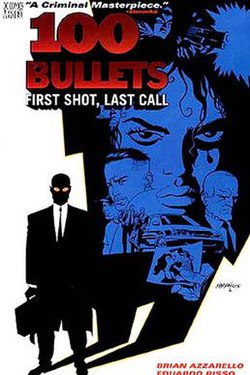100 Bullets
| 100 Bullets | |
|---|---|

Cover to 100 Bullets vol. 1 "First Shot, Last Call". Cover art by Dave Johnson.
|
|
| Publication information | |
| Publisher | Vertigo |
| Schedule | Monthly |
| Genre | |
| Publication date | June 1999 – April 2009 |
| Number of issues | 100 |
| Main character(s) |
Agent Graves Mr. Shepherd The Minutemen Dizzy Cordova Loop Hughes |
| Creative team | |
| Writer(s) | Brian Azzarello |
| Artist(s) |
Eduardo Risso Dave Johnson |
| Colorist(s) | Grant Goleash Patricia Mulvihill |
| Creator(s) |
Brian Azzarello Eduardo Risso |
| Collected editions | |
| First Shot, Last Call | ISBN |
| Split Second Chance | ISBN |
100 Bullets is an American comic book published by DC Comics under its Vertigo imprint. Written by Brian Azzarello and illustrated by Eduardo Risso, the comic book ran for 100 issues and won the Eisner Award and Harvey Award.
Both the writing and artwork in 100 Bullets exemplifies the noir and pulp genres of popular modern fiction. Consistent with noir convention, most of the characters are deeply flawed. As is also common in pulp and noir genres, 100 Bullets frequently portrays stylized and graphic violence.
100 Bullets is notable for creator Brian Azzarello's realistic use of regional and local accents, as well as the frequent use of slang and oblique, metaphorical language in his characters' dialogue.
Initially presented as a series of self-contained episodic stories, 100 Bullets developed into a sprawling crime saga in which all the characters and events were connected.
The core concept of 100 Bullets is based on the question of people willing to act on the desire of violent revenge if given the means, opportunity, and a reasonable chance to succeed. Many of the first issues involve the mysterious Agent Graves approaching someone who has been a victim of a terrible wrong. Graves gives them the opportunity to take revenge by providing a handgun, 100 bullets, and documentation about the primary target responsible for their woes. He informs the candidate the bullets are completely untraceable by any law enforcement investigation, and as soon as they are found at any crime scene, investigations will immediately cease.
Although all the revenge murders enabled by Agent Graves are presented as justifiable, the candidates are neither rewarded nor punished for accepting the offer other than their own personal satisfaction. Several people decline, but others who accept find varied success or failure. The attaché and Graves' "games" are later revealed to be only a minor part of a much broader story.
...
Wikipedia
